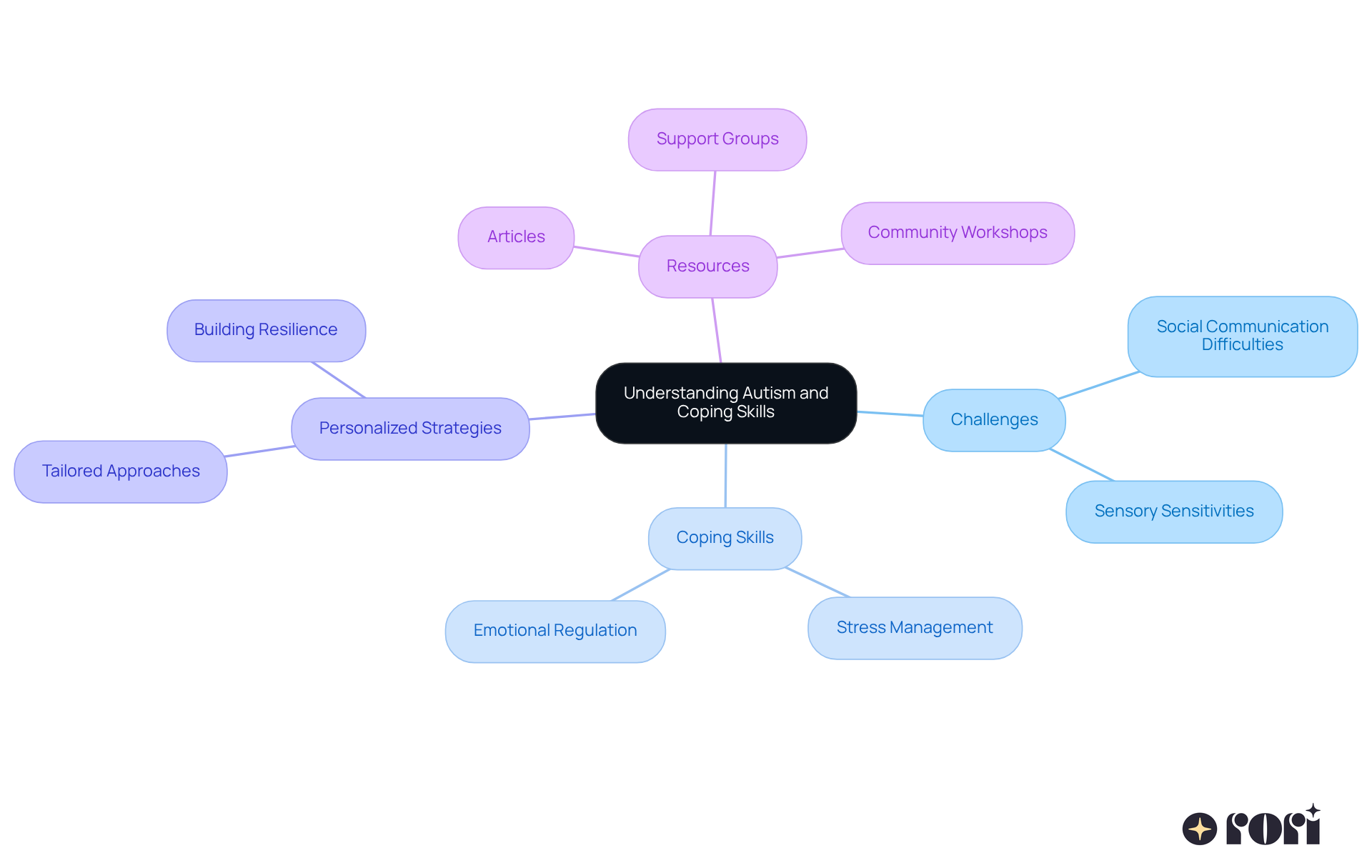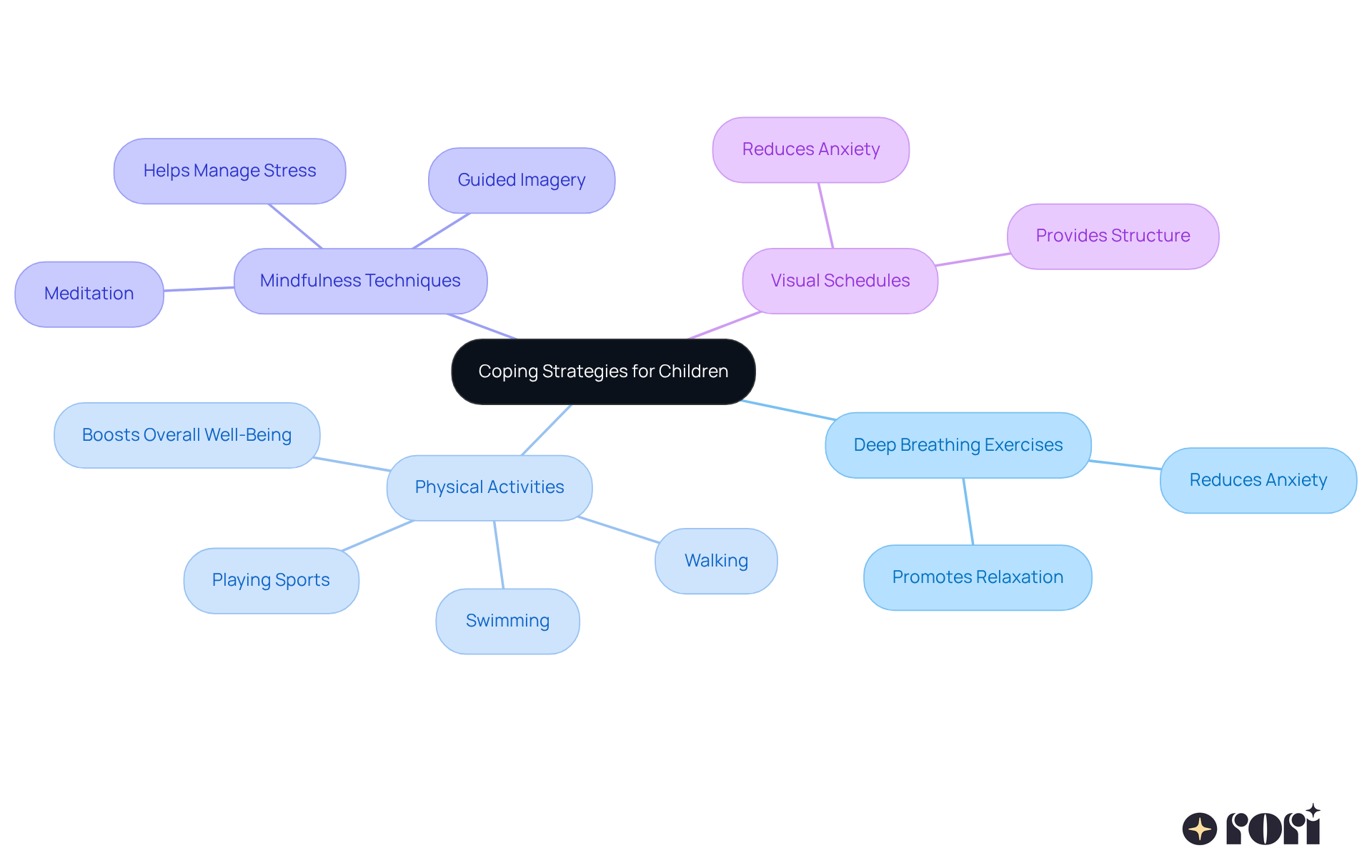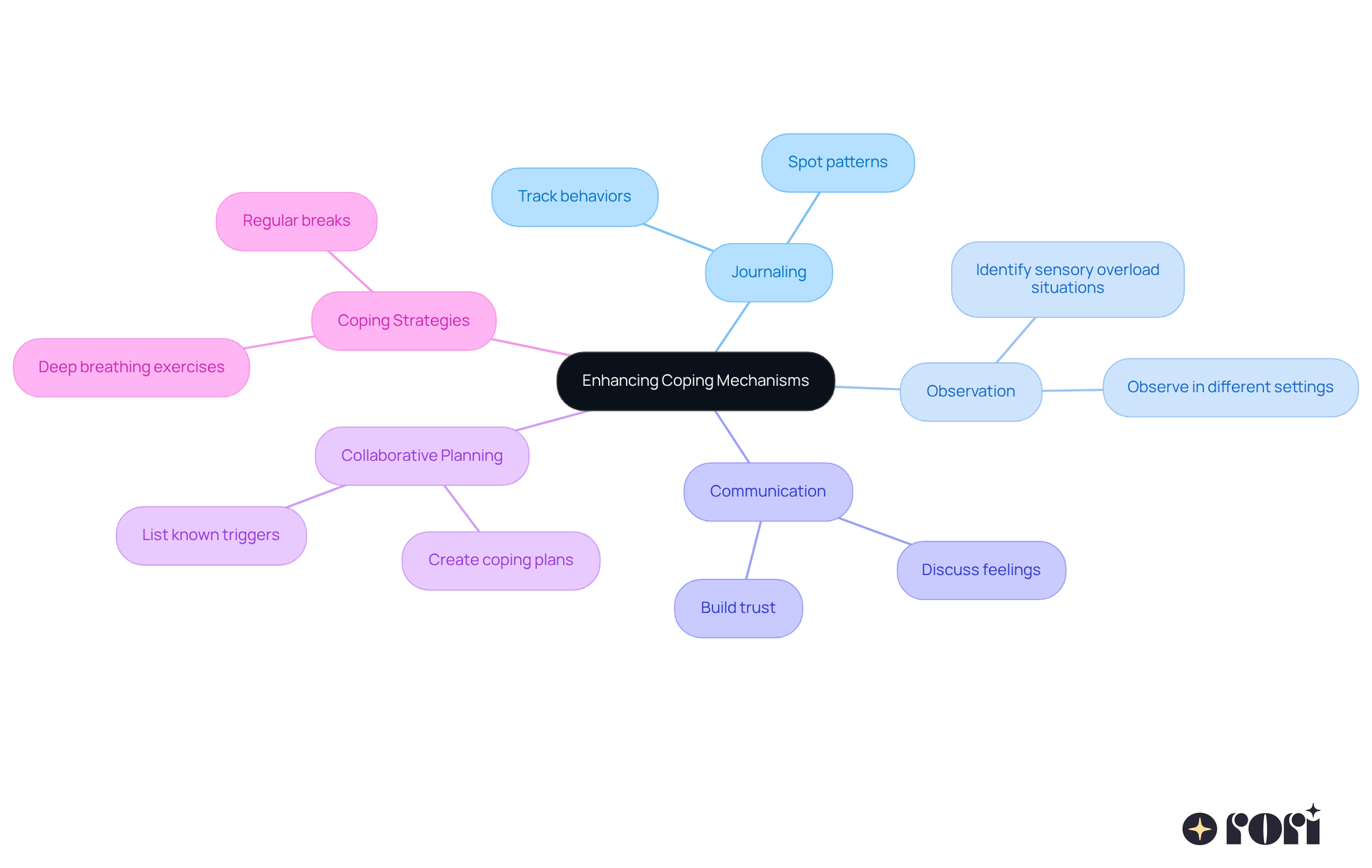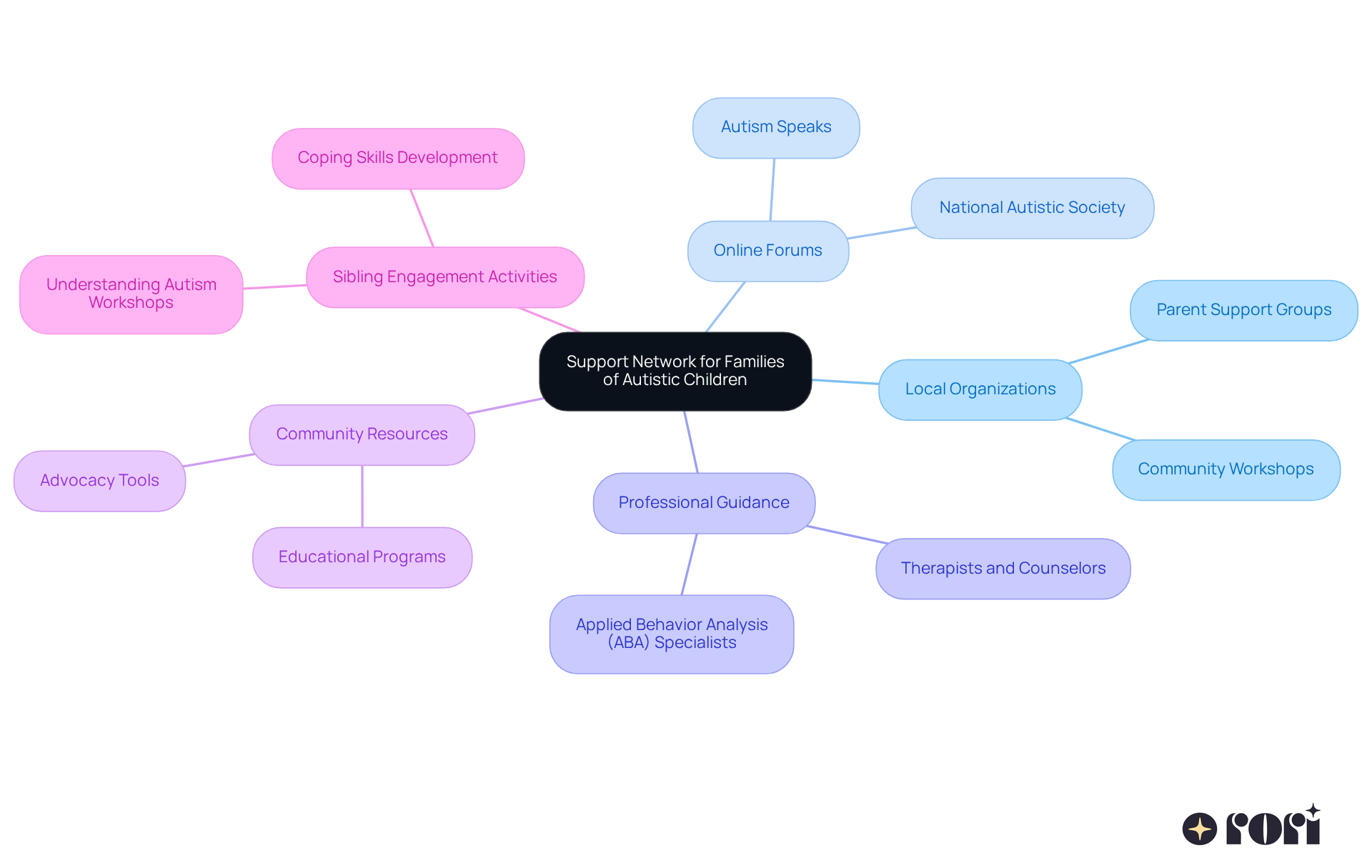Coping skills for autistic children can be developed effectively through some simple strategies. Think about:
These tailored approaches not only help manage anxiety and emotional challenges but also foster resilience and adaptability in children. They do this by addressing their unique needs and preferences.
As parents, it’s essential to recognize the power of these methods. By incorporating them into daily routines, you’re not just helping your child cope; you’re also nurturing their ability to thrive in various situations. Let’s explore this together! With a little patience and the right tools, we can support our children every step of the way.
Understanding the complexities of autism is crucial for nurturing the emotional well-being of autistic children. As these young individuals navigate a world filled with unique challenges—like social communication hurdles and sensory sensitivities—developing effective coping skills becomes essential. This article dives into four vital strategies that can empower parents and caregivers to help their children manage anxiety and emotional fluctuations.
So, how can families effectively equip their autistic children with the tools they need to thrive amidst daily challenges? Let’s explore this together!
Understanding autism is key, especially when it comes to the unique challenges like social communication difficulties and sensory sensitivities that can impact daily life. It's important to recognize that building coping skills for autistic child can significantly assist in managing anxiety, stress, and emotional ups and downs that many autistic youth experience. Research shows that effective stress management strategies can significantly boost emotional regulation and overall well-being. Remember, every individual on the autism spectrum is different, which means they need personalized strategies that cater to their specific needs and preferences. This tailored approach is essential for nurturing resilience and adaptability in various environments.
Let’s take a moment to explore a variety of resources together! Articles, support groups, and community workshops can greatly enhance your understanding of developmental disorders and effective coping strategies. Engaging with these materials not only provides valuable insights but also offers much-needed support for both parents and their children. As autism specialists often say, 'Coping strategies are not merely tools; they are lifelines that enable young individuals to navigate their world with confidence and ease.' This truly emphasizes the transformative impact that well-developed coping skills for autistic child can have on their lives. So, let’s explore this journey together and find the best ways to support our kids!

Teaching your kids some deep breathing exercises can really help them relax during those stressful moments. Research shows that these techniques can significantly lower anxiety levels in children with autism, thereby aiding in the development of coping skills for autistic child to manage their emotions and build resilience.
Encourage your little ones to get moving with regular physical activities like walking, swimming, or playing sports. Exercise is a fantastic way to release pent-up energy and ease anxiety. In fact, studies have found that children involved in organized physical activities see big boosts in their overall well-being.
Mindfulness techniques, like guided imagery or meditation, can also be a game changer. Psychologists who work with kids emphasize the benefits of mindfulness for autistic individuals, as it aids in developing coping skills for autistic child, helping them relax and better manage stressors in their environment.
Using visual schedules can be a great way to bring structure and predictability to your child's daily routine. This approach helps kids feel more secure and reduces anxiety by clearly outlining what they can expect throughout the day.
Let’s explore this together! Each of these strategies can make a real difference in your child's life, so why not give them a try?

Keeping a detailed journal can be a game changer for tracking your child's behaviors. It helps you spot patterns related to specific triggers. This practice not only deepens your understanding but also empowers you to make informed decisions about interventions, in line with the principles of Applied Behavior Analysis (ABA). As Alex Plank wisely puts it, "Autism is not a disability, it’s a different ability," reminding us of the unique strengths that can come from understanding these behaviors.
Take some time to observe your child in different settings. Notice when they might experience sensory overload, like in loud places or crowded environments. Research shows that 62% of sensory behavior trajectories were stable or even improved, highlighting the importance of keeping an eye on these experiences to develop effective coping strategies. This aligns perfectly with the adaptive treatment plans that Rori Care uses, which are regularly updated based on progress reports and caregiver involvement.
Encouraging open communication is so important! Talk with your child about the situations that make them feel anxious or overwhelmed. This kind of conversation builds trust and helps them express their feelings, emphasizing that understanding is key to providing support. Your active participation is essential here; it often leads to better behavioral outcomes and allows you to offer consistent support at home.
Why not compile a list of known triggers together? You can collaboratively create a plan to tackle them. This might include coping skills for an autistic child, such as calming techniques like deep breathing exercises or scheduling regular breaks to help manage stress. By fostering an atmosphere of acceptance and support, families can help children navigate their unique challenges. Plus, caregiver education enhances support and informed decision-making, ultimately benefiting from the personalized guidance and clear progress tracking that Rori Care offers. Let’s explore this together!

Connect with local organizations for parents of autistic children, where you can share experiences and effective strategies. These groups cultivate a sense of community and offer emotional assistance, which is so important for managing the challenges of autism. At Rori Care, we’re here to assist your family's journey through thorough and empathetic Applied Behavior Analysis treatment, ensuring you receive the support you need.
Utilize online forums and social media platforms, like Autism Speaks and the National Autistic Society, to connect with other families. These virtual communities provide flexibility and accessibility, allowing you to share resources and experiences no matter where you are. Engaging in online support groups can help diminish feelings of isolation and boost emotional health, aligning perfectly with Rori Care's mission to empower caregivers with knowledge and strategies for supporting their children's behavioral goals.
Consider seeking professional guidance from therapists or counselors who specialize in developing coping skills for autistic child. Their expertise can provide valuable insights and coping skills for autistic child specifically tailored to your unique situation, helping you navigate the challenges of caregiving. Temple Grandin once said, 'If I could snap my fingers and be non-autistic, I would not,' highlighting the importance of embracing autism and community support. Rori Care's clinical leadership team is dedicated to neurodiversity and the success of young individuals, ensuring families receive the best possible care through our personalized therapy sessions and caregiver education programs.
Explore community resources like workshops and educational programs designed to enhance your understanding and support your child's development. These resources empower families by providing essential information about therapies, educational rights, and advocacy tools, enabling you to advocate effectively for your child. Plus, consider sibling engagement activities that help brothers and sisters better understand autism and develop coping skills for autistic child. Rori Care emphasizes the importance of caregiver education, leading to improved behavioral outcomes and empowered caregivers.
Remember, support groups come in various forms, including peer-led, educational, professionally-led, and family help, so families can find the right fit for their needs. Engaging with these networks not only offers emotional support but also practical resources, reinforcing the idea that 'Autism is not a tragedy. Ignorance is a tragedy,' as noted by Kerry Magro. Let’s explore this together!

Understanding and implementing effective coping skills for autistic children is so important for fostering their emotional regulation and resilience. By recognizing the unique challenges these children face, parents and caregivers can tailor strategies that not only address anxiety and stress but also promote a sense of security and well-being. Each child on the autism spectrum is different, which highlights the need for personalized approaches to coping mechanisms.
The article shares several essential strategies, like:
These methods help manage daily challenges and empower children to identify their triggers and express their feelings. Building a strong support network through local organizations and online communities enhances the resources available to families, ensuring they don’t feel alone on their journey. Professional guidance and community engagement play pivotal roles in navigating the complexities of autism.
Ultimately, embracing the journey of supporting an autistic child requires a commitment to understanding and adapting to their unique needs. By actively seeking out resources, fostering open communication, and building a strong support system, families can significantly improve their child's coping skills and overall quality of life. The transformative power of these strategies reinforces the message that autism is not a limitation but an opportunity for growth and understanding. Let’s explore this together! We’re here to help you every step of the way!
Why is understanding autism important?
Understanding autism is crucial because it helps address unique challenges such as social communication difficulties and sensory sensitivities that can affect daily life.
How can coping skills benefit autistic children?
Building coping skills can significantly assist autistic children in managing anxiety, stress, and emotional fluctuations, leading to improved emotional regulation and overall well-being.
Are all autistic individuals the same in their needs?
No, every individual on the autism spectrum is different, which means they require personalized strategies that cater to their specific needs and preferences.
What resources are available for understanding autism and coping strategies?
Resources include articles, support groups, and community workshops that enhance understanding of developmental disorders and effective coping strategies.
How do coping strategies impact autistic youth?
Coping strategies serve as lifelines that enable young individuals to navigate their world with confidence and ease, highlighting their transformative impact on their lives.